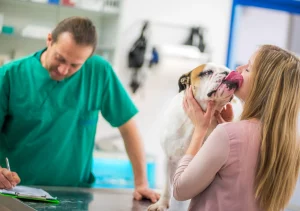Allergies in English bulldogs are very common and not surprising since they are very sensitive even though they look pretty resistant and strong as a breed! Don’t let their muscles and grumpy faces fool you; our bulldogs are soft and smushy and, unfortunately, prone to various health problems including allergies!
Are English bulldogs prone to allergies, and why?
English bulldogs are a great breed with wonderful personalities and adorable looks thanks to their genetics – but those quirky genetic traits have brought some problems with them! One reason is their unique facial structure, with those adorable wrinkles and folded skin. This makes them more susceptible to environmental allergens like dust mites and pollen.
The second thing that contributes to their allergy problems is their short coats. Because of their short coats, they are more prone to react to contact allergens like dust mites and harsh chemical products.
Another factor is their sensitive stomachs; Bulldogs often have food sensitivities that can trigger allergic reactions. Allergies can manifest in various ways for these sweet dogs, including excessive scratching, paw-chewing, ear infections, and even gastrointestinal issues like diarrhea or vomiting.
That is why we can say that genetics truly play a big role in English bulldog allergy problems, but don’t worry, there are some ways to prevent and manage these situations!
What types of allergies are common in English bulldogs?
When it comes to allergies in English bulldogs, we can categorize them into a few groups based on irritants. The most common allergies are food allergies, environmental, seasonal, and even flea allergies!
Environmental allergies in English bulldogs

These adorable wrinkly pups may be prone to some serious sniffles when exposed to certain environmental triggers. You see, English Bulldogs have sensitive skin and respiratory systems, making them more susceptible to allergens like washing and cleaning products, dust mites, or even mold spores. We could even say that environmental allergies are most often the contact type of allergies, and the reaction is seen on the skin, but they can affect breathing, too.
To manage this type of allergy, you should visit your veterinarian and listen to their advice. You should also try to wash your pup regularly, groom them often, and keep their environment clean and fresh!
Seasonal allergies in dogs

Believe it or not, seasonal allergies are pretty common in dogs, just like in humans, and Bulldogs are especially prone to them! Still, they are not the only breed that tends to get allergic reactions – Dachshunds are prone to allergies too, Frenchies and many other breeds!
When the sneezing and itching start, it is a clear sign that certain times of the year when pollen allergies are active are here! English Bulldogs can develop allergic reactions to pollen, grass, or even mold spores in the air. Some common symptoms include red and watery eyes, an itchy nose and throat, sneezing, and maybe even skin irritation or hotspots if things get really bad.
These allergies can be quite problematic, but there are some ways to manage them with the help of your vet and some preventive care!
Food allergies in English Bulldogs
Food allergies are one of the most common types of allergies in Bulldogs. They have such sensitive stomachs that almost any food can be a trigger for allergic reactions! Proteins such as beef, chicken, dairy, wheat, or other grains are often causes of serious allergies in bulldogs. Signs of food allergies may include gastrointestinal issues like vomiting or diarrhea, skin irritations like itching or rashes, and even respiratory problems. So, if you notice any of these signs after your Bulldog eats a specific type of food, it might be worth considering a change in their diet. A hypoallergenic dog food that eliminates common allergens can often alleviate symptoms.

What foods are Englsih bulldogs most allergic to?
When it comes to specific food allergies in Bulldogs, some ingredients tend to cause more reactions than others. Beef is a frequent offender, causing gastrointestinal upset, itching, and even ear infections. Chicken is another common allergen that can result in skin irritations, ear infections, and gastrointestinal problems. Dairy products, like milk, cheese, and yogurt, are also known to trigger allergies in Bulldogs, leading to symptoms such as diarrhea, vomiting, and skin rashes. Additionally, wheat is a known culprit when it comes to triggering food allergies in Bulldogs, causing itchy skin, ear infections, and digestive issues, and so is soy.
Even some of the processed dog foods are strong allergens because of their ingredients like food coloring or flavor enhancers. So, make sure to pick the right kind of dog food that does not contain allergy-triggering ingredients!
Flea allergies:
Flea allergies are a common issue among our furry friends, and Bulldogs are no exception. Our sensitive pooches can have a severe allergic reaction to flea saliva when even just one sneaky flea decides to make its home on their precious skin. This can lead to intense itching, redness, and irritation. Unfortunately, those infections can get pretty bad, and bulldogs can suffer and experience some behavioral changes like aggression, or they can start chewing themselves or your furniture. To prevent and manage this allergy problem, you should treat your bulldog against fleas and other parasites as often as your vet recommends!
Symptoms of allergies in Bulldogs

Identifying the symptoms of allergies in Bulldogs is one of the most important things because you can start the treatment on time and prevent serious problems! Some common signs of allergies in Bulldogs can look like this:
- Excessive scratching,
- Red and swollen skin,
- Hot spots,
- Hair loss,
- Recurring ear infections
- Respiratory symptoms
Actually, these signs of allergic reactions in English bulldogs can be divided into a few categories:
-
- Skin reactions are most common symptoms that you can spot very soon. You may notice that your pup is scratching, licking various parts of their body, and chewing excessively, especially their paws and belly area. They can get hot spots and rashes on their skin, and in severe cases, they can lose hair in infected body parts. Hair loss and severe rashes are mostly symptoms of flea allergies while scratching and chewing are related to contact allergens from the environment!
- Breathing symptoms are related to seasonal allergies and pollen, but they also appear when dust allergies are in line. You may notice that your bulldog is having some trouble breathing, like excessive sneezing, wheezing, and coughing, and it is all followed by some watery noses and eyes.
- Gastrointestinal signs of allergies are related to food allergies and can manifest with vomiting, diarrhea, and excessive gas passing. English bulldogs are known for farting quite a bit, so you may miss out on that sign, but in combo with other symptoms, it is an alert that allergies are there!
How to treat allergies in English Bulldogs?

How can you help your pup and treat allergies in bulldogs? Well, for beginning, it is crucial to determine the specific allergen causing the reaction. Identifying the allergen can be done through various methods, including allergy testing! Allergy tests are done by your vet, and there are a few ways to do them. Mostly, it is by putting a small amount of allergens on to dogs’ skin and waiting for reactions.
Once the allergen is confirmed, you and your veterinarian can make a treatment plan that will have the most efficiency and success!
- If it’s a food allergy, adjusting the diet is fundamental. A hypoallergenic diet that excludes known allergens is often the first step. Prescription diets or homemade meals prepared under veterinary guidance may prove beneficial.
- For environmental or seasonal allergies, your vet can recommend some medications like antihistamines, corticosteroids, or immunotherapy injections.
- Skin reactions can be treated with medications or creams.
Home remedies for dog allergies:
While professional treatment is the best way to help your pup, there are also some home remedies that can help alleviate allergy symptoms in Bulldogs:
- Regularly cleaning their bedding, keeping the house clean and free of dust and mold, and using air purifiers can minimize allergens in the environment.
- Bathing your Bulldog with hypoallergenic or medicated shampoos can provide relief and remove potential allergens from their coat.
- You may also consider using topical creams or balms to soothe itchy skin. However, it’s crucial to consult with your vet before trying any home remedies to ensure they are safe and suitable for your Bulldog.
Preventing allergies in Bulldogs largely revolves around minimizing exposure to allergens. A high-quality diet that is free of common allergens can reduce the likelihood of food allergies. Regularly cleaning your Bulldog’s paws and coat after outdoor activities can remove potential allergens such as pollen or grass. Frequent grooming and cleaning of skin folds and wrinkles can prevent the accumulation of irritants.
English Bulldogs may be prone to allergies, but there are several ways to manage and prevent them, and with a little care, lots of love, and affection you will have an allergy-free Bullie in no time!


Pingback: English Bulldog Skin Bumps: Causes, Care & Prevention - English Bulldog Breed
Pingback: 3 Different English Bulldog Tail Types | English Bulldog Shop
Pingback: How To Treat Hot Spots on Bulldogs? Tips That Can Help You
Pingback: The Ultimate Guide To a Blue English Bulldog | English Bulldog Shop
Pingback: White English Bulldog: Health, Training, and Fun Facts
Pingback: English Bulldog Diet for Sensitive Stomachs: Tips For Owners
Pingback: 6 Most Common English Bulldog Paw Problems
Pingback: What Is The Best English Bulldog Shampoo? Top 3 Picks - English Bulldog Breed